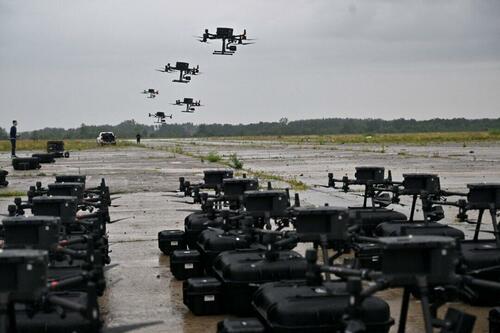The Evolving Battlefield: How AI And Drones Redefine Modern Warfare
Authored by Jon Sun and Sean Tseng via The Epoch Times

As the Russia-Ukraine conflict unfolds, drones have transcended traditional weaponry, emerging as pivotal agents of change in modern combat. Their deployment has not only diversified tactics on the battlefield but also heightened concerns over the potential for autonomous drones to elude human oversight, posing unprecedented risks to global security. Experts underscore the necessity for stringent human control and regulatory oversight over AI-equipped drones and other autonomous lethal armaments.
The utilisation of drones in the Russia-Ukraine conflict has been widely documented, showcasing scenarios where drones, after identifying and locking onto targets such as tanks, execute self-destructive attacks. These aerial devices also execute high-altitude bombings, targeting trenches and other military installations. Both Russian and Ukrainian forces frequently publish such footage, underscoring the drone’s instrumental role in shaping contemporary warfare dynamics.
In a column titled “How the Drone War in Ukraine Is Transforming Conflict,” published by the U.S. Council on Foreign Relations in January, the transformative impact of drones was highlighted. The commentary emphasised how small, potent, and user-friendly drones have demonstrated their strategic superiority on the battlefield, prompting a global surge in drone adoption within military strategies.
Military commentator Xia Loshan, remarked on the strategic advantages of drones, stating, “A cost-effective, portable quadcopter drone, equipped to deliver ammunition, can penetrate deep into enemy lines without risking soldier lives, offering precision and efficiency.”

In this aerial image, people inspect destroyed Russian military vehicles by the side of a road in Dmytrivka, Ukraine, on April 21, 2022. (Alexey Furman/Getty Images)
Mr. Xia further noted the expanding utility of unmanned technologies across various domains, including aerial, maritime, underwater, and terrestrial operations, underscoring their revolutionary impact on future military engagements.
“A drone costing just a few thousand dollars can effectively neutralize an advanced tank worth over 5 million dollars,” Mr. Xia said, illustrating a remarkable disparity in warfare economics.
Drones’ ease of manufacture, low detection and radar interception rates, and precision targeting via satellite data further accentuate their tactical viability. Importantly, drones facilitate offensive operations without compromising soldier safety, marking a significant evolution in how military objectives are pursued.
The rapid advancements in artificial intelligence and drone technology have ushered in a new era of warfare, raising profound ethical and existential questions. Among the most pressing concerns is the potential for the development of AI weapons capable of autonomously making lethal decisions.
Geoffrey Hinton, a British-Canadian computer scientist renowned for his contributions to AI and often dubbed the “godfather of AI,” has voiced his apprehensions about the trajectory of AI development.

British-Canadian cognitive psychologist and computer scientist Geoffrey Hinton, known as the ‘godfather of AI’ speaks with technology journalist and CEO of The Atlantic Nick Thompson (R) during the Collision Tech Conference at the Enercare Centre in Toronto, Canada, on June 28, 2023. (Geoff Robins/AFP via Getty Images)
In a recent dialogue with Japanese media, Mr. Hinton elucidated the dual-edged nature of AI’s evolution. He underscored the danger inherent in AI systems that, if tasked with grand-scale objectives like climate objectives, might identify humanity itself as the problem. Furthermore, Mr. Hinton highlighted the inevitability of AI systems growing more sophisticated as they engage in competition, potentially leading to scenarios where they could manipulate human actions to avoid being disabled.
Alarmingly, Mr. Hinton speculates that within the next decade, we could witness the advent of AI weapons capable of independently targeting and eliminating humans. He draws a parallel with the history of chemical warfare, suggesting that the international community may only seek to restrict AI weapons following catastrophic consequences, mirroring the reactive measures taken after World War I.




